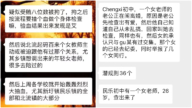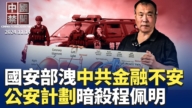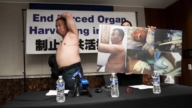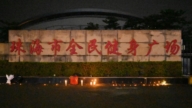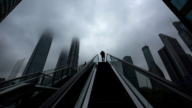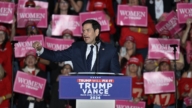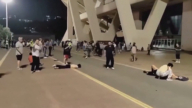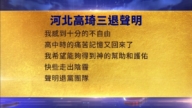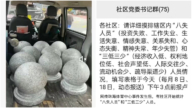【新唐人2014年05月14日讯】中国大学首次开设反恐专业和首次招生。公安部旗下的“中国公安大学”,将在今年招收80名大学生,专业就是“反恐”。有网民说要报名,也有网友反对。反对者表示:这个政权,就是想通过洗脑,制造更专业的专政工具。也有民众认为,中共当局藉“反恐”的名义搞“维稳”,打击的不是恐怖份子,而是眼中的所谓异议份子,不但不能增加国内民众的安全感,反而制造紧张、恐怖的氛围。
“中国公安大学”首次开设的“反恐”专业,是归在情报学系下面。主要学习课程包括﹕恐怖主义概论、恐怖组织研究、反恐国际合作、反恐情报、反恐专案侦查等。
不过,北京维权人士胡佳向《新唐人》表示,武警和公安部也设有相关的专业及单位。
北京社会活动家胡佳:“反恐,公安是第一次招,但是在武警的那些学院,反恐这个专业早就有了,公安部也有反恐局,北京市公安局也组建了反恐总队。”
日前,在北京发布的《国家安全蓝皮书:中国国家安全研究报告(2014)》中,最先谈到的就是恐怖攻击。报告说,去年中国境内恐怖活动呈高发状态。发生在境内的暴力恐怖主义袭击,2013年共有10起。
云南昆明火车站今年3月1号发生的砍人流血事件,被中共定义为“恐袭”。胡佳表示,昆明整个车站没有几个警察,而且警察的装备和训练,都被用于“维稳”。
胡佳:“我们所知道的恐怖份子都是爆炸、投毒,如果它设定的专业是针对这种类型的话,那么我们对此没有异议,但是现在的现象是,大量的以反恐名义出现的警察或者装备,实际上更多的功能不是对于恐怖份子的打击,而是形成了一种政策维稳中的那种棋子。”
5月12号,北京市街头“反恐”进入全新阶段。上午9点起,150辆首都巡警武装巡逻车开始在北京市街头运行,每辆车配备9名警察、4名辅警,巡逻车及警察将持枪长期驻守在北京的重点大街上。接警到场时间将不超过3分钟。
胡佳:“我觉得它出来的这个点,比如5月12日出来,整个和今年六四25周年的维稳是紧密相关的。暴力恐怖占第二位了。”
胡佳说,上一次在北京街头出现这样的持枪景象,是1989年那些戒严部队的军人们。
胡佳:“我总觉得说,在我们这个国家,藉反恐的名义搞维稳,这个是更突出的现象,不管它是开设什么专业,配备什么样的装备,但是我觉得当权者和我们一样都心知肚明。反正就是说,荷枪实弹的警察站在街头的话,他确实有可以对恐怖份子的这样的一种震慑,但同时仍然是给大多数的老百姓制造紧张、压抑、和恐慌的氛围。”
一位“不具名”的网友在《美国之音》留言表示:“做贼的喊捉贼。共匪比其他所有恐怖份子总和还要恐怖,刻意让人民生活在恐惧当中,没有言论,上网,或是选举的自由。还强迫人民生活在污染的环境当中。人民不从,抗议垃圾处理不当,还要被说成是聚众滋事。”
辽宁网友张顺:“中共政府的能力只能对人民,他根本没有能力去对外。主要还是针对于国内,包括所谓的异议份子,他们定义的异议份子。你说哪个世界、哪个国家如果发生什么争端了,它(中共)可不可以派维和部队(去)﹖”
北京网友马强:“应该说也是迫于中共造成的这些民族政策的矛盾,包括他们上层的矛盾等等这些问题,导致他们面对这个社会力不从心,所以增设了一个专业希望补充这方面的人才,但是我觉得根本不能解决根本上的问题,根本上的问题我觉得还是体制的问题,是制度的问题。”
浙江杭州市余杭区的民众,两周来持续抗议当地垃圾焚化发电厂项目。10号,警民发生冲突,700名警察到场。官方媒体报导,至少10名示威者与29名警察受伤。
采访/朱智善 编辑/周平 后制/李勇
Anti-Terrorism CCP Style –Cracking-Down on the People and Dissidents
Universities in China have started the new Anti-Terrorism
major.
China Public Security University under the Ministry of
Public Security will enroll 80 students this year to major
in “Anti-Terrorism".
Some netizens said they would apply, others opposed.
Opponents said that the Chinese Communist Party (CCP)
regime wants to make more tools to support its dictatorship.
Some people believe that the CCP’s “Anti-Terrorism"
program is for “maintaining stability" and attack dissidents,
not terrorists.
It would not improve domestic security, but create a
constant atmosphere of terror.
China Public Security University opened the
“Anti-Terrorism" major in the Department of Intelligence.
Main courses include: Terrorism Theories, Terrorist
Organizations Analysis, International Cooperation Against
Terrorism,
Counter-Terrorism Intelligence and Counter-Terrorism
Investigation, etc.
However , Beijing Human Rights Activist Hu Jia told NTD
that Armed Police colleges and Ministry of Public Security
also have relevant majors and working units.
Hu Jia: “It is the first time the public security system
enrolls students in the ‘Anti-Terrorim’ major.
But it has long been there in colleges under the Armed Police.
The Ministry of Public Security has an Anti-Terrorism Bureau.
Beijing Public Security Bureau also has Anti-Terror Troops."
Recently, Beijing released its National Security Blue Book:
Chinese National Security Study Report (2014).
It mentioned terrorist attacks at the beginning.
The report said terrorist activities in China was high in 2013,
with ten cases of violent terrorist attacks inside China.
CCP defined the bloodshed at Kunming Railway Station
on March 1 2013 as a “terrorist attack."
Hu Jia said that not many policemen were stationed at the
Kunming Railway Station,
as the entire police equipment and training are used for
“stability maintenance."
Hu Jia: “We know that terrorists mainly engage in activities
such as explosions and poisoning.
If the force is set up againt these activities, we do not object.
But now a large number of policemen and equipment,
in the name of counter-terrorism,
are not set up to fight against terrorist attack,
but as tools to maintain the stability of CCP policies."
On May 12 “Anti-Terrorism" entered a new stage
on the streets of Beijing.
Starting from 9a.m., 150 armed patrol vehicles
drive on the streets in Beijing.
Each vehicle is equipped with nine police officers
and four auxiliary policemen.
Armed patrol vehicles and policemen will be
stationed in key streets long-term.
They will respond to alarms within three minutes.
Hu Jia: “I think it’s exposure at this point is closely
related to the maintenance of stability
upon 25th anniversary of the Tiananmen Square Massacre.
Anti-Terrorism is secondary."
Hu Jia said last time armed troops were on the streets of Beijing
were soldiers implementing martial law in 1989.
Hu Jia: “I always feel that it is a prominent issue that the CCP
engages in stability maintenance in the name of fighting terrorism,
no matter what kind of major it sets up or what equipments they use.
I think those in power know as much as we do. Heavily armed
police officers standing on the street does threaten terrorists,
but it creates more tensions and panic for the majority of people."
One anonymous netizen left a message at VOA:
“Bandits shout about catching bandits. The CCP is a biggest terrorist
organization than anyone else.
It forces people to live in terror. People have no freedom of speech,
the freedom of using the internet, or freedom of election.
It also forces people to live in a polluted environment.
Those who oppose improper waste disposal
are defined as mobs looking for trouble."
Liaoning netizen Zhang Shun: “The CCP government
only has the ability to suppress the people.
It does not have the ability to handle the outside world.
Its main target is the China people including the so-called
dissidents defined by them.
Do you think that the CCP can send peacekeepers overseas
if something happened outside China?"
Beijing netizen Ma Qiang: “The CCP cannot handle the
society with conflicts caused by its ethnic policies and
conflicts between top CCP officials.
It sets up this major to recruit resources in this area.
I do not think it would fundamentally solve the problem.
The fundamental problem is the problem of the system."
People in Yuhang District of Hangzhou City, Zhejiang Province
have been protesting for two weeks against the local garbage
incineration power plant project.
On May10, police and people clashed. 700 police arrived on
the scene. 10 demonstrators and 29 policemen were injured.
Interview/Zhu Zhishan Edit/Zhou Ping Post-Production/Li Yong


